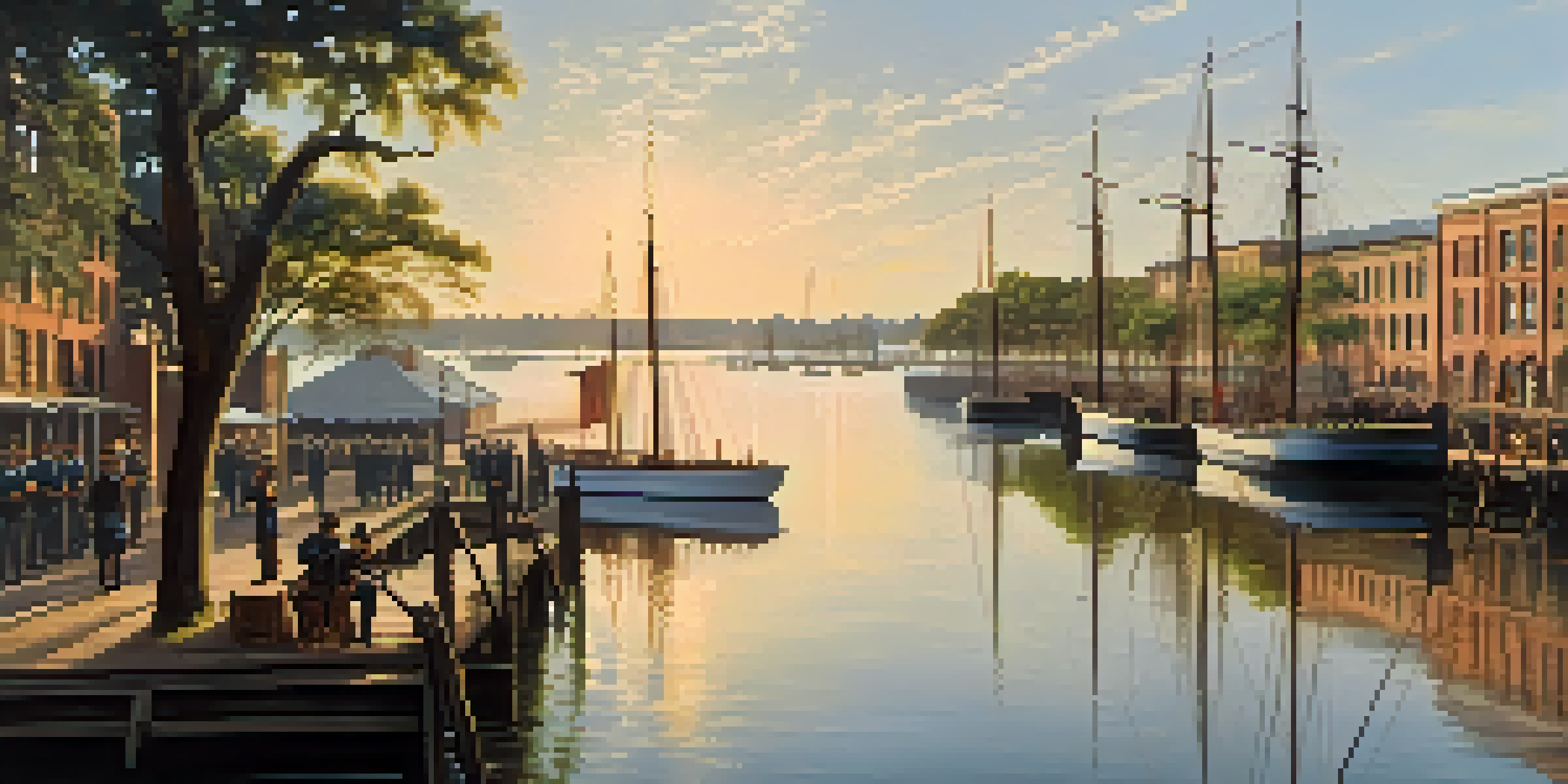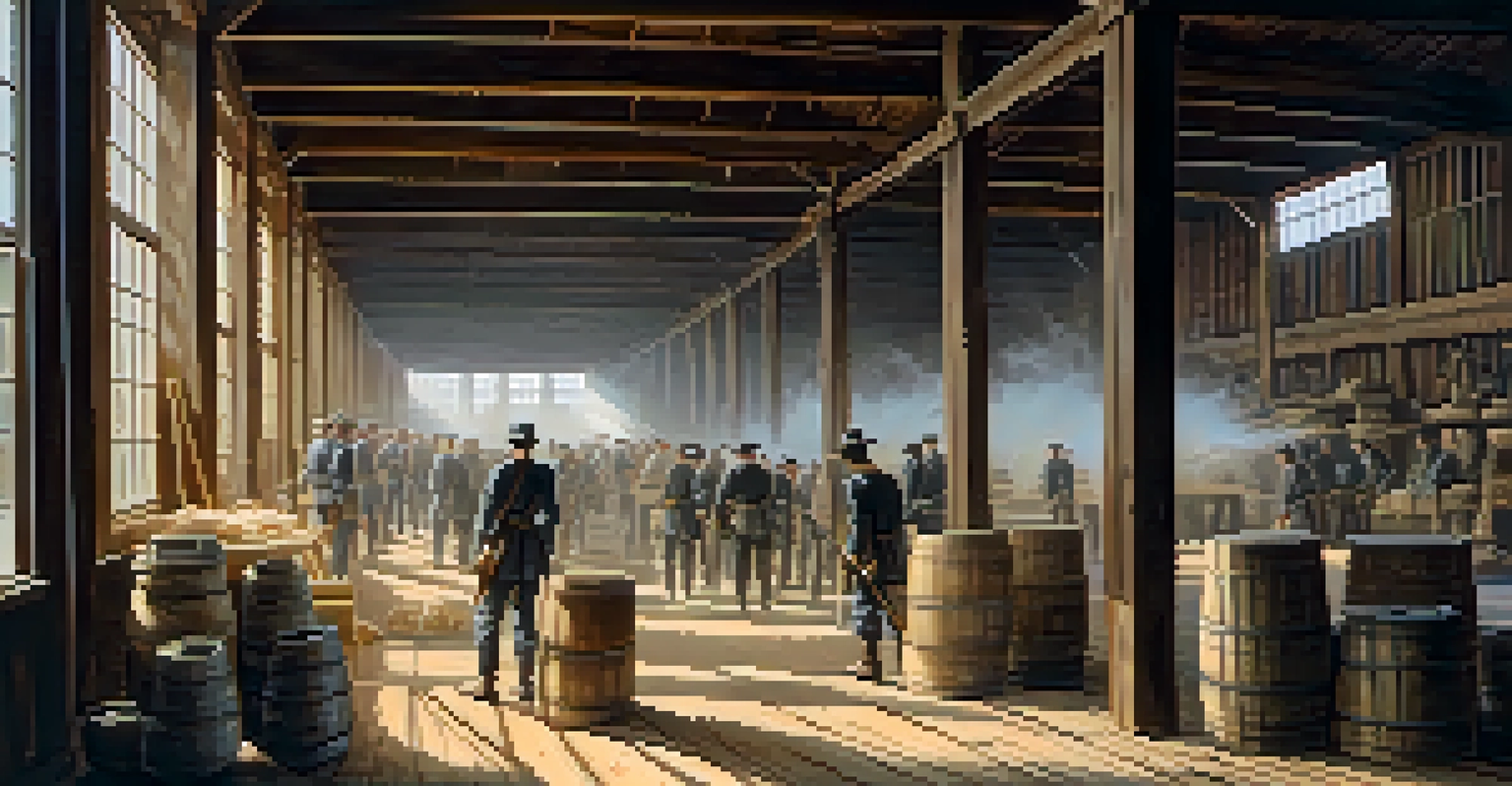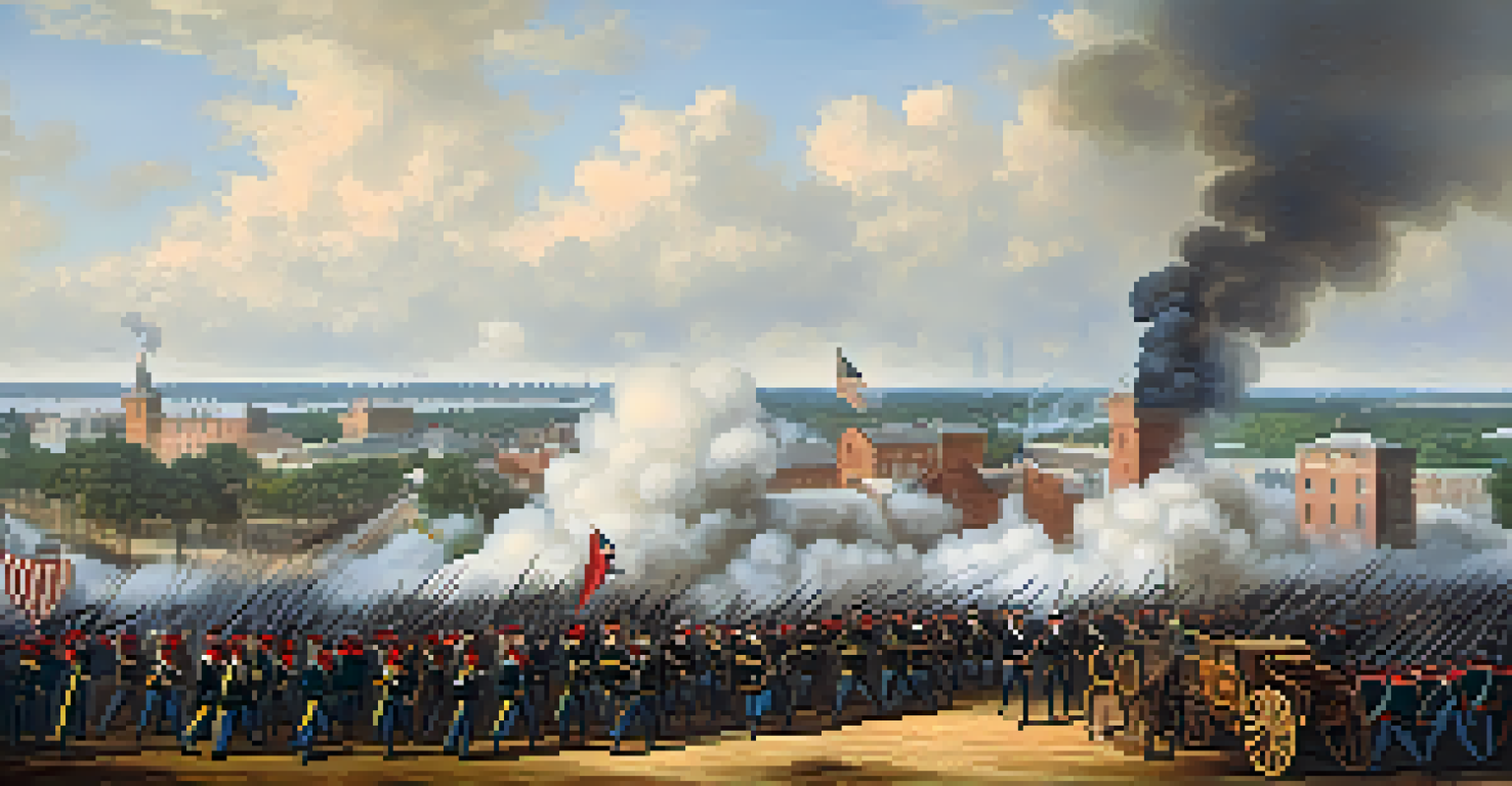Savannah's Strategic Importance During the Civil War Era

Savannah's Geographical Significance in the Civil War
Savannah's location along the coast of Georgia made it a strategic asset during the Civil War. Positioned near the Savannah River, it served as a vital port for the Confederacy, facilitating the transport of troops and supplies. This geographical advantage allowed the city to play a crucial role in naval operations, impacting the war's outcome.
The past is never dead. It's not even past.
The city's access to the Atlantic Ocean meant that goods could be shipped and received quickly, providing much-needed resources to Confederate forces. The river itself was a natural barrier, making it a challenging point for Union forces to penetrate. This strategic positioning turned Savannah into a key player in the southeastern theater of the war.
Additionally, Savannah's railroads connected it to other parts of the South, further enhancing its logistical importance. The combination of waterways and railways made it a hub for military movement, which was essential for sustaining the Confederate war effort against the Union.
Savannah's Role as a Confederate Supply Center
During the Civil War, Savannah emerged as a critical supply center for the Confederacy. The city's port facilitated the importation of arms and ammunition, as well as food supplies, which were vital for sustaining Confederate troops. The efficient handling of these supplies helped prolong the Southern fight against Union forces.

Moreover, Savannah's warehouses were filled with cotton, a major cash crop for the Confederacy. This resource was not only valuable for trade but also served as a bargaining chip in negotiations. Control of the cotton trade added another layer of strategic importance to Savannah during the war.
Savannah's Strategic Military Role
Savannah's coastal location and river access made it a key asset for the Confederacy, facilitating troop movement and supply transport during the Civil War.
As a supply center, Savannah was also a target for Union blockades aimed at crippling the Southern economy. These blockades aimed to cut off supplies and weaken Confederate forces, demonstrating how Savannah's importance made it a focal point in military strategies.
The Siege of Savannah: A Turning Point
The Siege of Savannah in late 1864 marked a significant event in the Civil War, showcasing the city's strategic importance. Union General William Tecumseh Sherman, after his infamous March to the Sea, turned his attention to capturing Savannah. This siege was not only about military might but also a psychological tactic to demoralize the Confederacy.
History is not a burden on the memory but an illumination of the soul.
The Confederate defenses were formidable, but the overwhelming numbers and resources of the Union forces eventually led to the city's surrender. This pivotal moment not only gave the Union control of Savannah but also opened the door for further advances into the South. The fall of Savannah was a blow to Confederate morale and a significant gain for the Union.
Following the siege, Savannah's capture provided the Union with a strategic foothold in the South. It allowed for better supply lines and troop movements, ultimately contributing to the Union's success in the war. The siege and subsequent fall of Savannah underscored the city's critical role in shaping the war's trajectory.
Savannah's Cultural and Economic Impact
Beyond its military significance, Savannah also played a crucial cultural and economic role during the Civil War. The city was a melting pot of Southern heritage, and its preservation efforts during the war reflected the deep cultural ties to the Confederacy. This cultural identity became a rallying point for Southern sympathizers.
Economically, the war transformed Savannah's landscape. As a major port city, it experienced fluctuations in trade and commerce due to the ongoing conflict. The city's economy was heavily dependent on cotton and trade, which were directly impacted by the war, leading to a shift in its economic structure.
Impact of the Siege of Savannah
The Siege of Savannah in late 1864 marked a turning point in the Civil War, leading to Union control of the city and altering the dynamics of the conflict.
The impact of the Civil War on Savannah's culture and economy can still be seen today. The preservation of historic sites and the city's commitment to remembering its past reflect the lasting influence of this era. Savannah's unique blend of heritage and history continues to attract visitors and historians alike.
Post-War Recovery and Strategic Rebuilding
After the Civil War, Savannah faced the daunting task of recovery and rebuilding. The destruction from the war had significant impacts on the city's infrastructure and economy. However, the strategic importance of Savannah remained, as it became a focal point for reconstruction efforts in the South.
The post-war era saw the city shift from a Confederate stronghold to a Union-controlled territory, changing the dynamics of its governance and economy. Federal investment in the city's infrastructure aimed to restore Savannah's status as a key economic player in the region. This rebuilding phase was essential for revitalizing the city and its strategic role.
Savannah's recovery also highlighted its resilience and adaptability. The city's ability to bounce back from the devastation of war underscored its significance in the South. This rebirth laid the groundwork for Savannah to emerge as a vital economic and cultural center in the years following the Civil War.
Legacy of Savannah in Civil War History
Savannah's legacy in Civil War history is profound and multifaceted. The city's role as a strategic military hub and supply center has been chronicled in numerous accounts, highlighting its importance in the broader context of the war. This legacy continues to be a point of interest for historians and visitors alike.
The stories of bravery and resilience from both Union and Confederate soldiers during the Siege of Savannah have become part of the city's narrative. These historical accounts not only honor those who fought but also underscore the complexities of the Civil War. Such tales remind us of the human experiences that shaped this pivotal time in American history.
Cultural Legacy of the Civil War
Savannah's rich history and cultural heritage during the Civil War continue to attract interest and preserve the stories of bravery from both sides.
Today, Savannah stands as a testament to its past, with museums, tours, and historical sites that educate the public about its strategic importance during the Civil War. This focus on preservation ensures that the city's contributions to the war are not forgotten, allowing future generations to learn from its history.
Exploring Savannah: A Historical Journey
For those interested in exploring Savannah's rich Civil War history, the city offers numerous sites and tours that delve into its past. From historic homes to battlefields, visitors can immerse themselves in the stories that shaped the city. These experiences provide a tangible connection to the events of the Civil War.
Walking through Savannah's historic districts, one can see the architectural influences of the time, reflecting the city's cultural heritage. Guided tours often highlight the significance of various landmarks, allowing visitors to gain a deeper understanding of Savannah's role during the war. This exploration can spark a greater appreciation for the city's complex history.

Engaging with Savannah's Civil War narrative not only enriches one's understanding of the past but also fosters a sense of connection to the present. The city's ongoing commitment to preserving its history ensures that the stories of bravery and resilience continue to resonate with visitors today.